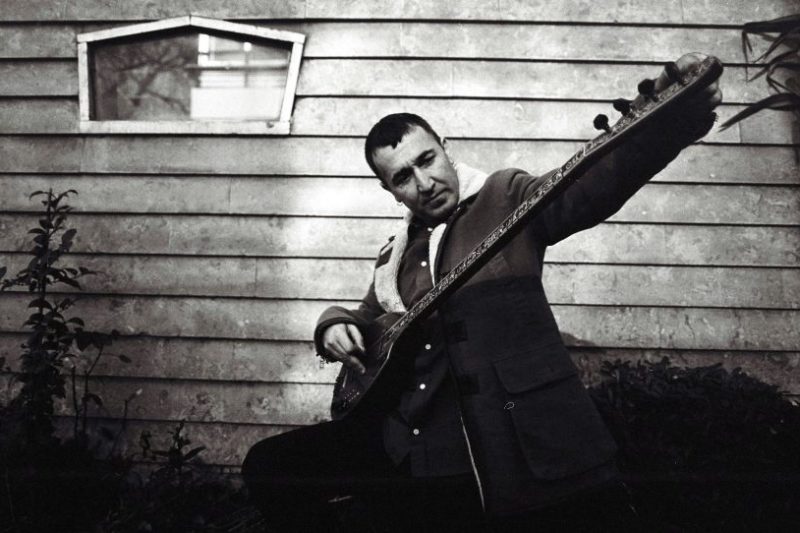"Just as life, music is also everchanging": Cem Yıldız
“The thing that fuels me is traditions without a doubt. I like electronic music very much but I can call myself simply a saz artist. I like bağlama more than any other instrument.”
Interview by Cem Kayıran – Photography by Aylin Güngör – Translation by P. Ceyda Toksöz
Cem Yıldız is a member of Orient Expressions and iNSANLAR. He has also played with other artists from Zülfü Livaneli to Sabahat Akkiraz for many years and produced many pieces, and has made music for television and film. Kalan Müzik has just release his second solo album “Cem’an”.
Bant Mag. spoke to Cem about his album, a collection of pieces he has made for televison and film, reimagined, as well as number of new compositions. The album blends the sweet tones of the saz with cutting-edge electronic music.
So is “Cem’an” intended to be a retrospective of your career?
I did what I think to be true for myself in this album. Some people take their years of musical accumulation and turn that into an album in a short period, like two or three months. This album took its shape differently in my case, because of some other works I do. I started making the electronic music tracks on the album three years ago. They took a few months. And the other tracks were used in various films and series. These are the ones that are popular because they advertise themselves. A short part of the track ‘’Dönülmeyen Gitmeler’’ on the album was aired in the series called Başka Semtin Çocukları. Now it is the most popular one of this album. I sang the song ‘’Üflediler Söndüm’’ on the album, which is another popular piece, many other artists sang it too. But people didn’t know that this song is mine, so, as a proof I put it between tracks of this album. Actually there are many other new songs on the album.
A different version of the iNSANLAR track “Kime Ne’’ is also in the album.
I made a studio version of ‘’Kime Ne’’. In fact, the song has many different versions, for instance, the Ricardo Villalobos’ remix. I thought I could do one too.
‘’Kime Ne’’ and the section coming after is the most fascinating. This seems to be the most original section of the album. Could you tell me a bit about how did you make a transition to electronic music production?
I started making the electronic music section after the conservatory, while looking for an answer to the question ‘’what kind of a change can I make in my music?’’. I can say, I sort of came across to it. While working with Richard Hamer and Murat Uncuoğlu in Orient Expressions, I found an interest in electronic music practically. Before that, there was a search all the time. I observed Murat very well. He is our expert. I learned a lot from him. He guided me much on which equipment I should use. Someone showed us the path, and then we walked it. The thing I was searching for was not specifically electronic music in the beginning. But after these experiences, I really enjoyed it. I don’t claim to make this type of music exceptionally well, but like it tremendously.
There doesn’t seem to be such a claim in the album and the tracks.
I have never had any big claims in life; neither in electronic music, nor in acoustic music. I always try to present the work that I like to produce.
In the album Cem’an ‘’Yalnızlık’’ and ‘’Bi Zaman’’ have a touch of electronica, but this intensifies in ‘’Müjde’’.
I caught the effect of bağlama in ‘’Yalnızlık’’ endmost. It is one of my latest pieces. There is a very different and unique atmosphere in this piece. I actually played and sang it like an old aşık would do. Traditional listeners like it at the beginning of the song, but as it continues, at some point, they ask themselves what is going on in this song.
That is the point that fascinated me the most.
That’s why one cannot say it has a pure electronic structure, it is something in between. It is more of a unique thing. Since you say you noticed this, I feel I have accomplished what I meant to do.
The way you play and your other projects’ suggest you feel closer to folk music’s hypnotic side. The electronic elements of your music seem to emphasise this, in a different way.
Of course it is. Since I am a traditionalist, there is no one in Turkey who makes the electronic music the way I do. After I finished the album, I thought to myself, there was such a gap, so I have turned towards it. The thing that fuels me is tradition without a doubt. I like electronic music very much but I can call myself simply a saz artist. I like bağlama more than any other instrument. I think I present an alternative with the music I make.
On your album, the blend you mentioned feels authentic.How do you write your songs. Do you have one approach, or do different pieces shape up in different ways?
There is no absolute method. We are actually trained to do so. For series’ music, we work on the demand of customers; we make music in the style they want us to make. Sometimes it is a poem, sometimes it is a certain style. For me, song writing is kind of like a game. Sometimes I start working on the lyrics first, sometimes I only write rhythms, and sometimes I arrange the melody and then support it. I work with every option I have.

Since your first solo album, you have played a part in many different projects. But you have waited nine years for the second solo album. How has your view of music changed since then?
Many things have changed. They always do. This moves along proportionate with life. One gains a more mature, more optimist attitude to their work, as they becomes more experienced. Because of these experiences, some things become more steady but innovations never end. This is about one’s ego. One never gets truly fulfilled. I already work on instruments, and the other sectors I work influence this very much. On the other hand, innovations in electronic music never cease. There is always new equipment and I try to keep up with that, I have to. Some of my friends ask me when the setup in my house will be finished. Well, if the production stops, then I will stop buying too! Of course, there are the issues of living in Turkey. Social and economic conditions and any kind of problem have to have an impact on production here. It does not matter whether you are apolitical or not, how will you make music without going outside, on the streets? Just as life, music is also ever-changing. I do not have strict rules on making music, I flow with the mood I have. And I do not say the music I make now is better than what I made ten years ago. I just say, I came across to something like that now. Cem’an includes pieces from between 2011-2016. If I had not used a few series music, this was going to be a completely new album.
Although there are pieces from different years in the album, there is also timbral coherence in a thematic way. Did you go over and work again on the songs you mentioned before releasing the album?
Yes, of course. We redid the mixes, changed some instruments. I do not think the album sounds incoherent in general either. In acoustics we preferred a tempo a little slower than moderato, a rhythm that is calmer. It was an album made without the concern of earning money. I would like it to be popular of course, but I do not release an album to have it popular. For one of my songs on YouTube someone commented ‘’you used a bad note in fortieth second.’’ Do people really think I am not aware of this? I intentionally do everything I do in music. I am well aware of that bad note in there and for me it is not a bad note. Since albums on the market are technically perfect, people expect me to also be so. But as I said, this is something related to one’s point of view of life. If you looks for flaws, you will find a great amount of them. That is not one of my concerns. When I play is generally the very first recordings, especially improvisations. I look for the soul. For instance I have been asked to whom I wrote the song “İmkansız Aşk” (Impossible Love). To no one. I have never had an impossible love. That phrase made me feel something, took me to a place. Apparently in that point, we could sense a common feeling with the people who love my music.
Is there a background story of the name Cem’an?
One of my oldest friends both in life and work Neşe Şen and I were talking about the album. I asked her if she had any ideas on album’s name, she said Cem’an right away. I asked ‘’wouldn’t it sound too egocentric?’’. Then she told me this phrase’s meaning was actually summation, and it was not like what I thought. We decided it would be compatible with the content of the album.
Are we going to wait this long the next album?
No. After Cem’an I am going to release albums more often. I will make a pause for one year at maximum and then return to stage. There is a project on Aşık Veysel, first I want to finish it in short time. In a year, maybe in a year and a half, I want to release a new album. The tracks of it are ready.



